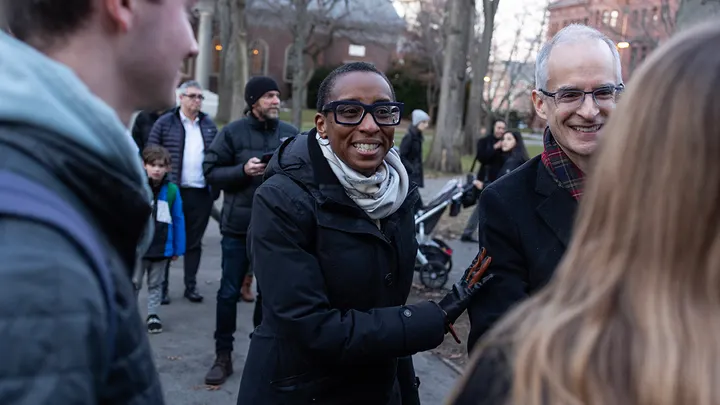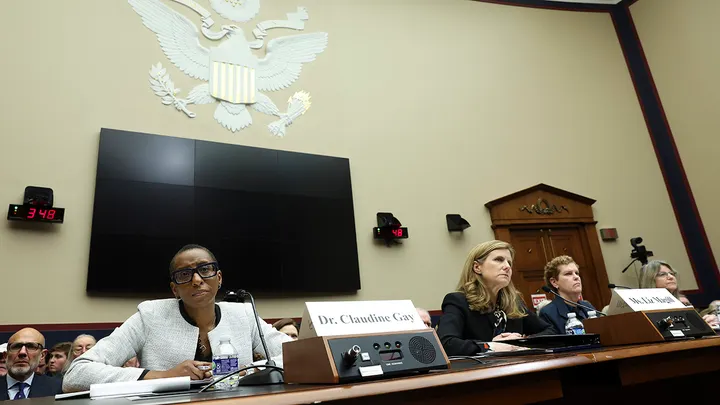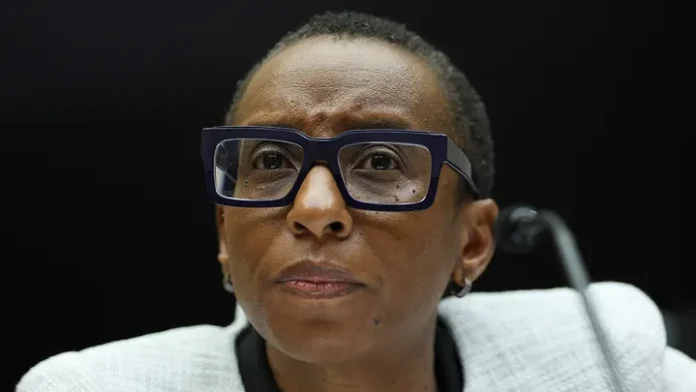Harvard president accused of plagiarism: Harvard University reported Wednesday night that a newly disclosed study discovered additional instances of poor citation in president Claudine Gay’s papers, just hours after a congressional committee started an investigation into how Harvard handled plagiarism complaints against Gay.
According to a three-page summary sent to the Globe, a subsequent assessment uncovered further “examples of duplicative language without appropriate attribution” in Gay’s 1997 PhD dissertation, which she completed in Harvard’s government department.

The report went on to say, “President Gay will update her dissertation correcting these instances of inadequate citation.”
These incidents are in addition to other instances of “inadequate citation” in two of Gay’s scholarly works, which were noted last week by the university’s major governing board, the Harvard Corporation. Gay has subsequently requested corrections from the publications that published the pieces, according to a university official.
According to the synopsis, Harvard was informed on October 24 that the New York Post “was pursuing a story on allegations of plagiarism against President Gay.”
The Corporation subsequently commissioned an independent assessment of the accusations by outside experts at Gay’s request, according to the summary. Meanwhile, the Corporation announced that a four-member group analyzed Gay’s published work from 1993 to 2019.
However, the PhD dissertation was not included in the examination since the charges targeted Gay’s “published works,” not her dissertation, according to the summary. The panel “undertook a review of the dissertation” just recently, “in response to new allegations,” according to the institution.
Following the completion of the evaluations, “the Corporation concluded that Gay’s inadequate citations” in her dissertation and other publications “did not constitute research misconduct,” according to the summary.
According to the review rules, “a finding of research misconduct requires that… the respondent committed the research misconduct intentionally, knowingly, or recklessly,” according to the Interim Policy and Procedures for Responding to Allegations of Research Misconduct. The claim must be “proven by preponderance of evidence.”
Gay had previously stated that he will propose four revisions to two scholarly publications as a result of the results of the independent assessment.
The summary was released on Wednesday, 10 days after Gay, a political scientist, was accused of failing to adequately cite sources she paraphrased in her academic work and of reproducing entire sentences or paragraphs nearly verbatim and without quotation marks.

Those charges followed another controversy: Gay’s response to a question at a congressional hearing on antisemitism on college campuses on Dec. 5 regarding whether demands for the annihilation of Jews would violate Harvard’s guidelines. Her legalistic and ambiguous response spurred resignation requests, notably from members of Congress. Gay later expressed regret for her response.
MIT President Sally Kornbluth drew criticism for offering identical responses before the congressional hearing, but her school’s governing board gave her a vote of confidence on Dec. 7. Liz Magill, the president of the University of Pennsylvania, resigned on December 9 after receiving criticism for her testimony.
Some of Gay’s plagiarism charges were originally made public by conservative activist Christopher Rufo on December 10, before the Harvard Corporation officially responded to the outrage over Gay’s testimony.
On December 12, the Corporation’s appointed members unanimously supported Gay, stating in a statement, “Our extensive deliberations affirm our confidence that President Gay is the right leader to help our community heal and address the very serious societal issues we are facing.”
The Washington Free Beacon, a conservative news source that carried one of the first extensive investigations on the charges, said on Tuesday that additional plagiarism allegations against Gay had surfaced.
According to the publication, a 37-page anonymous complaint was made to a Harvard research integrity officer. The allegation was mentioned in the summary issued by Harvard on Wednesday.
The summary, however, stated that the school’s Research Integrity Office, which “ultimately reports to the President,” would not investigate the complaint “due to the potential for the appearance of a conflict of interest.” The original assessment of the New York Post claims was likewise delegated to independent specialists to prevent the impression of a conflict of interest, according to the statement.
Gay’s academic writings, including peer-reviewed articles and her PhD dissertation, were accused of 39 instances of suspected plagiarism in the complaint. According to the summary provided Wednesday, it combined some of the previously disclosed charges and also highlighted four new cases that the Harvard Corporation found did not have validity.
Gay requested four corrections in the two peer-reviewed publications and is revising three instances of insufficient citation in her dissertation.
Several academics, including several of those accused of plagiarism by Gay, have stated that some of the sections highlighted in recent days constitute plagiarism.
In one case, Gay’s 1997 PhD dissertation had five phrases that closely matched a section from a 1996 article by Bradley Palmquist and D. Stephen Voss, both of whom were then members of Harvard’s government department, where Gay was a doctoral candidate.
Gay’s phrases mirrored the terminology from the 1996 study practically precisely, with just slight alterations in word choice and punctuation. The wording was not put within quotation quotes, and Palmquist and Voss’ article was not cited anywhere in a full-text PDF of Gay’s dissertation that the Globe reviewed.
The Harvard synopsis Gay’s dissertation would be amended on Wednesday to include quotation marks or a citation to the Palmquist and Voss piece.
Last week, Voss told the Globe that the sentence in question was “technically plagiarism,” but not a significant offense. According to him, the section discussed a minor methodological difficulty, “not any key ideas that are at the heart of the paper.”
Still, he said, it was an obvious breach of academia’s rigid attribution and source requirements. “When you use somebody’s exact words and paragraph logic, [that’s] what we teach students is plagiarism,” he went on to say.
Other experts have stated that some of the highlighted portions, which paraphrased from other sources and were properly credited, do not constitute plagiarism.
The congressional committee’s investigation into plagiarism claims revealed Wednesday complements its ongoing investigation into campus antisemitism at Harvard, UPenn, and MIT. Following a congressional hearing on December 5, the House Committee on Education and the Workforce began it.
Representative Virginia Foxx, a North Carolina Republican, asked in a letter to the Harvard Corporation that the school turn over “[a]ll documents and communications concerning the initial allegations of plagiarism” and the school’s examination into them.
In recent months, disputes about how to discuss the Israel-Hamas war, charges of censorship of pro-Palestinian speech, and tales of growing campus antisemitism have roiled Harvard and other colleges.
The debates erupted during the Oct. 7 Hamas-led onslaught on Israel, which killed over 1,200 people. According to Palestinian officials, Israel’s punitive assault in the Gaza Strip has killed around 20,000 Palestinians.
During the congressional hearing, New York Republican Representative Elise Stefanik questioned Gay, “[A]t Harvard, does calling for the genocide of Jews violate Harvard’s rules of bullying and harassment, yes or no?”
Gay said, “It can be, depending on the context.”
- 2026 Winter Olympics Locations: Amazing Guide to Milano Cortina
- Bryan Kohberger: Idaho Murders Uncovered
- ‘It’s Perplexing. It’s Painful’: Kohberger Sister Breaks Silence in NYT Interview
- In the Idaho Murders, Her Brother Admitted Guilt. Now Bryan Kohberger Sister Speaks
- George Kittle Injury Update: George Kittle Unlikely to Play in Crucial 49ers-Bears Clash
